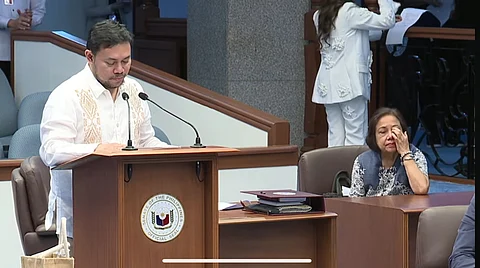
- NEWS
- the EDIT
- COMMENTARY
- BUSINESS
- LIFE
- SHOW
- ACTION
- GLOBAL GOALS
- SNAPS
- DYARYO TIRADA
- MORE

After 12 years in the Senate, Cynthia Villar looked back on a career marked by legislation focused on supporting farmers and protecting the environment.
Villar, who has long positioned herself as an advocate for agriculture, food security, and environmental protection, delivered her farewell speech on 10 June.
“My goal has always been to improve the quality of life of our people, especially our farmers who feed us,” she said.
During her time in the Senate, Villar was involved in the passage of over 20 agriculture-related laws.
These included the Free Irrigation Service Act, the Anti-Agricultural Smuggling Act, the Sugarcane Industry Development Act, and the Philippine Salt Industry Development Act.
As chair of the Senate Committee on Agriculture, Food and Agrarian Reform, she supported the creation of 63 fish hatcheries around the country.
She later led the Committee on Environment, Natural Resources and Climate Change.
Under her leadership, the Expanded National Integrated Protected Areas System (E-NIPAS) Act was passed, which designated 94 new protected areas across the Philippines.
Villar also backed specific environmental laws such as the Mt. Pulag Protected Landscape Act, the Tirad Pass Protected Landscape Act, and the Sicogon Island Wildlife Sanctuary Act.
Another key measure she authored was the Extended Producer Responsibility (EPR) Act, which requires producers to take responsibility for the plastic waste they generate.
“We must see waste not just as something to discard, but something to reuse and repurpose,” she said. “It is the responsibility of those who create waste to deal with it.”
During the Covid-19 pandemic, she worked with fellow lawmakers on emergency measures to keep the country’s food supply chain stable and to extend aid to vulnerable communities.
“I was proud to be part of an institution that helped our nation respond and recover,” Villar said, expressing gratitude to the five Senate presidents she worked with and to colleagues past and present.
In the Senate, Villar was often called “Mama Bear” by her peers—an acknowledgment of her assertive yet nurturing leadership style. As she stepped down, she emphasized that public service doesn’t end with a term.
“Service doesn’t stop when the term ends,” she said. “Instead, it marks the beginning of new ways to make meaningful contributions to the country.”
